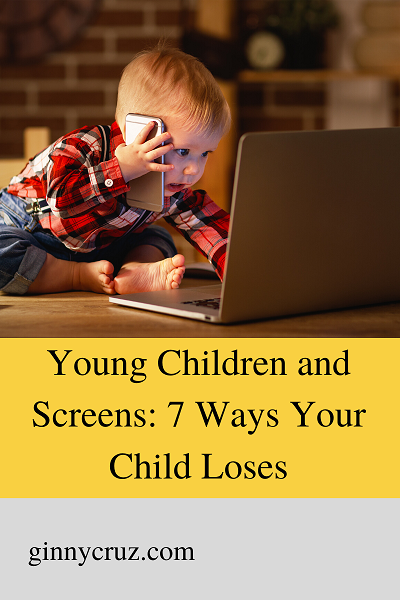Young Children and Screens: 7 Ways Your Child Loses
We buy computers, tablets, and apps for our children believing the educational benefits will help our child succeed. Learning colors, matching shapes, and mastering whatever the learning challenge is will be good for our young Einstein, right? That’s what the advertising promises, at least. But are these electronics and the extensive time today’s children spend on them really delivering smarter and healthier children?
In one of my recent articles, I shared the latest recommendations and research findings on screen time and the disturbing trends being discovered. The findings were posted in the Lancet, a well-known and long-respected source of solid scientific information. In short, you can trust it. The findings included the fact that children who spend a lot of time on screens, even playing “educational” games, demonstrated DECREASED brain function in key areas, such as attention, focus, and memory. Not what a parent wants to read, right?
The human brain is an incredibly complex organ. Research continues to demonstrate that no matter how advanced our machines are, we, humans, are still very much creatures of the natural world. Let me explain.
You learned in school that humans have five senses which are used to interact with the world. That’s partly accurate as there are actually seven senses and your child needs to learn and become acquainted with the natural world using each sense. Let’s look at each sense or sensory system and demonstrate how a program on an electronic screen can’t deliver what Mother Nature can.
- Vision – This is the system most intrigued and distracted by the images on electronic screens. The bright colors and rapidly moving pictures are mesmerizing and almost trance-inducing. But, here’s the problem: the images are two-dimensional (having only length and height). Real things in the real world are three-dimensional (having length, height, and depth) and the brain learns to interpret depth perception (how far down is the floor from the countertop?) and spatial orientation (am I upside down or not?) better with three-dimensional vs. two-dimensional images. Your child loses a brain-building opportunity if inadequately exposed to three-dimensional shapes. Mother Nature wins here.
- Hearing – Here’s another system that quickly falls under the spell of the electronics. We’ve all become used to distracting alerts, dings, and background TV noise. Here’s the problem: these electronic sounds aren’t as deep and rich as natural sounds. Ask any musician and they’ll agree. A real bird’s chirp and a cartoon bird’s chirp aren’t the same. The brain can tell a difference because there is a difference. Your child loses a brain-building opportunity if not adequately exposed to natural sounds (human voices, musical instruments, nature sounds, etc.). Mother Nature wins here.
- Taste – If your child licks the strawberry image on the iPad screen, they don’t taste a real strawberry. So it is pretty obvious, your child loses out by not tasting real foods and nonfoods, such as grass or dirt. Mother Nature still better.
- Smell – Duh. Electronic screens offer nothing for your child to smell. And smell and taste go together. Your child loses out if he/she can’t recall the smell of chocolate cookies baking in the oven or has no experience with the scent of cedar on the wind. Mother Nature wins, hands down.
- Touch – The science is clear and the case is strong that your child’s hands are weak and too sensitive to textures because of the extensive time spent playing on tablets, computers, and phones. Weak hands cause difficulties with handwriting, scissoring, manual dexterity, and playground skills, such as climbing, riding bikes, and hitting balls. Don’t want your child to lose by struggling in school or be a fence-sitter on the playground? Follow the screen time recommendations established by the American Academy of Pediatricians and the World Health Organization. Mother Nature is superior again.
- Vestibular (balance) – You didn’t learn this system in elementary school, did you? Well, it exists. All the moving young children engage in (rolling, crawling, climbing, spinning, etc.) are necessary to stimulate and teach the vestibular system which way is up, down, over, under, etc. Your child must have a strong vestibular system to protect themselves from falling and to be coordinated with playground activities. Your child loses these valuable learning opportunities when sitting for long periods of time interacting with a screen. No contest – Mother Nature wins.
- Proprioception (position sense) – Here’s another system you didn’t learn in school. This system tells your brain where your body is in space, such as “my head is on my shoulders” and “my knees are straight”. It works intricately with the vestibular system. Again, your child loses brain-boosting information when spending hours slumped on the sofa, swiping a screen or engaging in games with a two-dimensional image. Again, Mother Nature is the best teacher.
Your child’s body has seven sensory systems and these need to be well educated by real-world experiences. Nothing on a screen, even “educational” software, can train as nature can. Your child needs real colors, real smells and sounds, and real friends that are only available in their richest sense in the natural world.
I know you want your child to succeed in life. I desire that for your child, as well. Please take a look at your child’s habits and get them on a better track toward building a strong brain and body. The science is clear that screens are detrimental to young children.
(Photo from Adobe)
Additional resources:
9 Signs of Screen Addiction in Kids
Handheld Screen Time Linked to Speech Delays in Young Children
Effects of Screentime on the Health and Well-Being of Children and Adolescents

